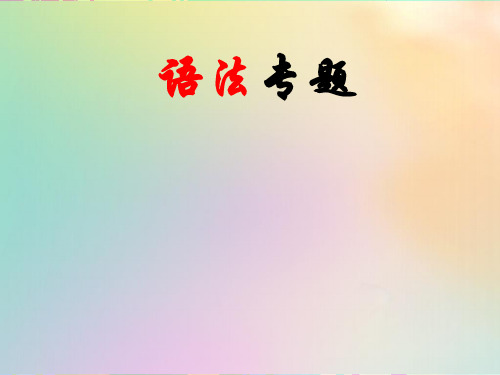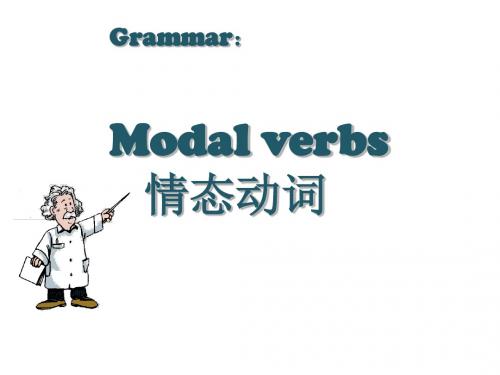高中英语语法情态动词公开课ppt课件
合集下载
情态动词全部ppt课件

16
Some festivals are held to satisfy the ancestors, who might return either to help or to do harm.
推测
17
--- Excuse me. Is this the right way to the Summer Palace?
3. will/would
1. 表示意愿,will表示现在的意愿, would表示过去的意愿。
I will stick to my plan though all of you are against it.
I told him to give up smoking, but he wouldn’t
3. During the vacation, he would visit me
every four days.
过去的习惯
4. Will / Would you pass me the ball,
please?
请求
习惯,倾向 5. Birds will fly to the south in the winter. 24
You can go with them if you like.
--- Could/Can I have a look at your new design? --- Yes, of course you can.
(注意此处答语不能用could)
8
3)用在肯定句中,表示_客__观__上__有__可_ 能 Anybody can make mistakes. Driving on the snowy roads can be very dangerous.
Some festivals are held to satisfy the ancestors, who might return either to help or to do harm.
推测
17
--- Excuse me. Is this the right way to the Summer Palace?
3. will/would
1. 表示意愿,will表示现在的意愿, would表示过去的意愿。
I will stick to my plan though all of you are against it.
I told him to give up smoking, but he wouldn’t
3. During the vacation, he would visit me
every four days.
过去的习惯
4. Will / Would you pass me the ball,
please?
请求
习惯,倾向 5. Birds will fly to the south in the winter. 24
You can go with them if you like.
--- Could/Can I have a look at your new design? --- Yes, of course you can.
(注意此处答语不能用could)
8
3)用在肯定句中,表示_客__观__上__有__可_ 能 Anybody can make mistakes. Driving on the snowy roads can be very dangerous.
【高中语法复习】情态动词(共48张PPT)

need to do
need do
Need 的回答
Need I come here tomorrow ? Yes, you must.
No, you needn’t. / you don’t have to.
Johnny, you ____ play with the knife, or you ____ hurt yourself.
猜测
--Oh my god ! Can it be true ? --It can’t be ture.
常用词组积累 can not/ never…too; can’t…enough
can’t help doing
无论怎么…都不过分 禁不住;不由得
I could have worked out the question, but I was too nervous.(过去有能力做但未做)
I must take care of my hairstyle.
must 的回答
-不用mustn’t回答-
Must I go to school today?
Yes,you must !
No, you don’t have to. /needn’t. /had better not.
You mustn’t bully your brother. He must have seen the answer.
时态 单复数 肯定变否定
提问
3
情感和态度
can
could may
might must should
情态动词 情态实意
must, can, could, may, might, ought stohall, should, will, would
need do
Need 的回答
Need I come here tomorrow ? Yes, you must.
No, you needn’t. / you don’t have to.
Johnny, you ____ play with the knife, or you ____ hurt yourself.
猜测
--Oh my god ! Can it be true ? --It can’t be ture.
常用词组积累 can not/ never…too; can’t…enough
can’t help doing
无论怎么…都不过分 禁不住;不由得
I could have worked out the question, but I was too nervous.(过去有能力做但未做)
I must take care of my hairstyle.
must 的回答
-不用mustn’t回答-
Must I go to school today?
Yes,you must !
No, you don’t have to. /needn’t. /had better not.
You mustn’t bully your brother. He must have seen the answer.
时态 单复数 肯定变否定
提问
3
情感和态度
can
could may
might must should
情态动词 情态实意
must, can, could, may, might, ought stohall, should, will, would
高中英语情态动词的用法(30张PPT)

• You ought not to be late for such an important meeting.
• ought I to hand in my composition now?
7. will和would:
will是助动词或是情态动词 用于构成将来时是助动词。 用于表“意志/决心/请求”是情态动词。 would亦同理,只是表过去。
• (3) 提供帮助、建议 • Should I help you with the community affairs?
• (4)表惊奇,愤怒,失望等情感 • It is surprising that Mary should love such a person
as Jack.
• 6. ought to • 否定: ought not to/ oughtn't to • 疑问:将ought置于主语前
• 对现在的否定推测 • can't be doing • can't be +表语
• You can't be hungry already---you had lunch only 2 hours ago.
• It can't be my father. He is now abroad.
• 对过去的肯定推测 • may/might have done • must have done
• John is absent. He may/might be ill.. • Let's speed up. They may/might be waiting for us now.
• You must be ill. I can see it from your face. • George must be sleeping now.
• ought I to hand in my composition now?
7. will和would:
will是助动词或是情态动词 用于构成将来时是助动词。 用于表“意志/决心/请求”是情态动词。 would亦同理,只是表过去。
• (3) 提供帮助、建议 • Should I help you with the community affairs?
• (4)表惊奇,愤怒,失望等情感 • It is surprising that Mary should love such a person
as Jack.
• 6. ought to • 否定: ought not to/ oughtn't to • 疑问:将ought置于主语前
• 对现在的否定推测 • can't be doing • can't be +表语
• You can't be hungry already---you had lunch only 2 hours ago.
• It can't be my father. He is now abroad.
• 对过去的肯定推测 • may/might have done • must have done
• John is absent. He may/might be ill.. • Let's speed up. They may/might be waiting for us now.
• You must be ill. I can see it from your face. • George must be sleeping now.
情态动词语法讲解PPT课件

2表示“许可”和“不许”
a)请求对方“许可”可用can, could, may, might.
may/might较正式,could/might较委婉
表示给予“许可”通常用can/may,而不用 could/might
Could I use your phone? Yes, of course you can. Might I trouble you for a light? You may indeed.
表示将来的“必须”,常用have to的一定 形式(will/shall have to) 比较:
•We must do it again.(表示现在)
•We’ll have to do it again.(表示将来)
•表示过去的“必须”,常用had to
•I had to leave at six yesterday.
•They must be home by now.(他们现在一定到家了)
will/would表示“推测”可有三种情况
1)对特定事态的推测
A: Who’s that man over there? B: That will be George, no doubt. C: That would be George, I except.
• Can they have missed the bus?
• Yes, they may have.
may not重音落在助动词上,表示 “不可能”,重音落在否定词上,表 示“不许可” , 比较:
•He may not go tomorrow.
•He may not go tomorrow.
•所以在书面语中,表示“不可能” 常用can’t
高中英语情态动词精品PPT课件

— Might I watch TV after supper? — Yes, you ________. A. may B. must C. might D. could
.
11
3.表推测,表示主观上的推测,“可能,
也许”,不用于疑问句, might比
may的可能性更小
She may not like this place.
—Yes, he _______. A. need B. must C. may D. will
.
15
2. must表示肯定的推测。 The light is still on, so he must be at home.
Look at his new car. He ______ have a lot of money. A. should B. shall C. may D. must
I can’t believe my eyes. Such well-educated
gentleman ____ behave like this!
A.will B. would C. should D. must
What time ought I _______?
A.arrived
B.arriving
C.arrive
D.to arrive
He _______ speak to his mother like that. A.ought not to B.doesn’t ought to C.not ought to D.ought to not
.
22
1. should= ought to 表示劝告,建议,意 为“应该”, ought to 语气更强些,强调“有责任,有 义务做”
《情态动词讲解》课件

1
表示能力和可能性
这一用法涉及到情态动词在表示一个
表示推测和推断
2
人或事物的能力或可能性方面的应用。
情态动词还可用来表示具有推测性质
的情况和推断。
3
表示义务和建议
情态动词可用于表示某人应该或必须
表示意愿和打算
4
做的事情,或者提出建议。
用情态动词来表达某人的意愿或打算 进行的行为。
情态动词的否定和疑问
3 同时使用情态动词和实义动词时的注意事项
了解使用情态动词和实义动词时需要注意的细节。
总结
情态动词的重要性
深入理解情态动词的重要性,以及它们在语言中 的作用。
情态动词的学习方法
提供一些有效的学习方法,帮助您更好地掌握情 态动词的用法。
参考资料
书籍推荐
推荐一些深入学习情态动词的相关书籍。
网站推荐
建议一些在线资源,以便进一步学习和练习 情态动词。
2 may/might
表示推测和推断的情态 动词。
3 shall/should
表示义务和建议的情态 动词。
4 will/would
表示意愿和打算的情态动词。
5 must
表示必须和必然的情态动词。
情态动词的用法
情态动词有多种用法,我们将详细讨论其中的一些,包括表示能力和可能性、推测和推断、义务和建 议,以及意愿和打算。
特点
情态动词具有几个典型的特点,例如它们没有人称和数的变化,并且后面跟原形动词。
情态动词的种类
情态动词有几种常见的类型,我们将深入讨论其中的几个种类,包括can/could、may/might、 shall/should、will/would以及must。
1 can/could
高中英语情态动词 课件(共22张PPT)

A. could have led B. would lead C. should have led D. must lead
【答案】A
情态动词
考点链接
请用合适的情态动词及括号内所给动词的适 当形式填空。
(1)—Tom graduated from college at a very young age.
2. He might have given you more help, but he was busy then.
情态动词
3. He abandoned a career that ______ to his becoming one of the most influential people in the world.
【答案】C
情态动词
1. Since this road is wet and slippery this morning, it _____ last night.
A. Must rain B. was raining C. Must have rained D. may rain 【答案】C
2. I believe he _____ an accident, otherwise he would have arrived on time.
(3)—Need I go with you to the office? (肯定回答)
—____________. 【答案】 Yes,you must
情态动词
(4)—Might I have talk with you this evening?(肯定回答) —____________. 【答案】 Yes,you can/may
A. to report B. to have reported C. to reporting D. have reported 【答案】B
【答案】A
情态动词
考点链接
请用合适的情态动词及括号内所给动词的适 当形式填空。
(1)—Tom graduated from college at a very young age.
2. He might have given you more help, but he was busy then.
情态动词
3. He abandoned a career that ______ to his becoming one of the most influential people in the world.
【答案】C
情态动词
1. Since this road is wet and slippery this morning, it _____ last night.
A. Must rain B. was raining C. Must have rained D. may rain 【答案】C
2. I believe he _____ an accident, otherwise he would have arrived on time.
(3)—Need I go with you to the office? (肯定回答)
—____________. 【答案】 Yes,you must
情态动词
(4)—Might I have talk with you this evening?(肯定回答) —____________. 【答案】 Yes,you can/may
A. to report B. to have reported C. to reporting D. have reported 【答案】B
高中英语语法专题复习课件--情态动词(共22张PPT)

but one of them 8. __c_o_u_ld___ (must, could) be your last. Decisions! Decisions! You may ask: 9. __m__u_st___ (can, must) I make decisions? The answer is yes. In most cases, you 10. __c_a_n_'_t__ (can't, needn't) skip this process.
_m__ig_h_t___ (shall, might) become the
richest.
(江西2014)
5. George __c_a_n_'t___ (mustn't, can't) have
gone too far. His coffee is still warm.
(浙江2016)
6. I _n_e_e_d_n_'_t_ (needn't, couldn't) have
2. No reader __s_h_a_ll___ remove a book from the library without the permission of the librarian.
can shall may should need
3. The girl ___ca_n____ not be Mary — she's in New York.
3. “情态动词+ have done”结构 1) could / might / should / ought to / need
have done意为“本来能/可能/应该/需 要做……,但实际上未做……”。如: He could have escaped, but he chose to stand and fight. It was an easy test and he should have passed, but he didn't.
- 1、下载文档前请自行甄别文档内容的完整性,平台不提供额外的编辑、内容补充、找答案等附加服务。
- 2、"仅部分预览"的文档,不可在线预览部分如存在完整性等问题,可反馈申请退款(可完整预览的文档不适用该条件!)。
- 3、如文档侵犯您的权益,请联系客服反馈,我们会尽快为您处理(人工客服工作时间:9:00-18:30)。
/No, you may not/mustn’t.
.
5.Making requests (提出要求):
I don’t know how to use this
equipment!
Can you help me with my training? .
6.Making suggestions (提出建议):
情态动词表示猜测是高考热点之一:
must>should>can>could>may>might (可能性)
1.He _____ be at home.
A.may
B.might C.must
2.He _____ be at home, for he
just called me from his home 15
.
1.Can you can a can as a caner can a can? 你可以像装罐工人那样装罐头吗?
2. How much wood would a woodchuck chuck
if a woodchuck could chuck wood?
如果一只土拨鼠会扔木头,那么会扔多少
木头呢? They
— Yes, you _c_an___. / No, you _ca_n_’t_/_I’m afraid not
.
can/could:
3.表示惊异、怀疑、不相信的态度。(主 要用在否定句、疑问句或惊叹句中)
Can this __________ be true?
He’s such a nice person that
seconds ago.
A.may
B.m.ight C.must
注意:对于现在和将来的推测用“情态动词+ 动词原形”,对于过去的推测用“情态动词+ 不定式完成式”。
Eg: may/might have done 可能已做了
can’t have done
不可能做了
情态动词+不定式完成式“责备”等多种意义。 need have done 本需要做但没做 needn’t have done 本不必做但做了 shoudn’t/oughtn’t to have done 本不该做但做了 should /ought to have done 本该做但没做 would rather have done 本想做但没做
A.can
B.may C.have to D.must
.
3.Certainty (可能性) :
Although the chance of winning a
medal is small, I’ll try my best!
Shi Dongpeng might win a medal
at the Olympic Games. .
hard to win the gold me. dal.
注意: must可表示“坚持,一定要”(常用 于固定句型:if you must do sth. 如果你 非得要做某事)
如果你真的要走,那就悄悄离开。
If you must leave, do it quietly.
.
Your mother brings you up and takes good care of you, so when she is old, you ___ look after her in return.
.
4.Permission (允许):
May I eat KFC if I win the gold
medal?
.
may/might:
1. 表示许可。表示请求、允许时, might比may的语气更委婉一些。
— Might/May I use your computer? — Yes, you may.
.
1.Ability (能力):
Liu Xiang can run the 110m
hurdle race wit. hin 13 seconds.
can/could: 1. can 一般表示与生俱来的能力或
者一种客观可能性,还可以表示请 求和允许 。
Man can not live without air.
.
2.Obligation (义务): I’m so tired! I have to do the training for at least 10 hours a day!
Although Liu Xiang is so gifted in hurdle race…
…yet he must work
3.ifHaowgomodancyoockoaocrkoeiuelsdccooies?
cook
如果一个好的m厨o师d能a做l 小甜饼,那么他能
做多少小甜饼v呢e?rbs.
What kind of verb are the underlined words ? .
he _c_a_n_’_t_ commit the crime!
你Ho怎w么ca会n 如yo此u 地be粗so心c!areless!
.
can/could: 4. can never/can’t……too表示 “无论怎样…也不过分”,“越…越 好” 。
你Y过woh马uil路eca的cnr时’ots候bsie再ng小tot心ohe也ca不rroe为afdu过.l 。
Learning English _c_a_n__ be difficult. __C_a_n___ I use your bike?
.
can/could:
2.在疑问句中,用could可表示请 求,语气较委婉。
He asks if he c_o_u_l_d smoke here. — C_o_u_ld_I have the television on?
.
一. We use modal verbs to talk about:
1. Ability (能力) 2. Obligation (义务) 3. Certainty (可能性) 4. Permission (允许)5. Make
requests(提出请求) 6. Make suggestions(提出建议) 7. Make offers(提供帮助) 8. Give advice(提出意见)
.
5.Making requests (提出要求):
I don’t know how to use this
equipment!
Can you help me with my training? .
6.Making suggestions (提出建议):
情态动词表示猜测是高考热点之一:
must>should>can>could>may>might (可能性)
1.He _____ be at home.
A.may
B.might C.must
2.He _____ be at home, for he
just called me from his home 15
.
1.Can you can a can as a caner can a can? 你可以像装罐工人那样装罐头吗?
2. How much wood would a woodchuck chuck
if a woodchuck could chuck wood?
如果一只土拨鼠会扔木头,那么会扔多少
木头呢? They
— Yes, you _c_an___. / No, you _ca_n_’t_/_I’m afraid not
.
can/could:
3.表示惊异、怀疑、不相信的态度。(主 要用在否定句、疑问句或惊叹句中)
Can this __________ be true?
He’s such a nice person that
seconds ago.
A.may
B.m.ight C.must
注意:对于现在和将来的推测用“情态动词+ 动词原形”,对于过去的推测用“情态动词+ 不定式完成式”。
Eg: may/might have done 可能已做了
can’t have done
不可能做了
情态动词+不定式完成式“责备”等多种意义。 need have done 本需要做但没做 needn’t have done 本不必做但做了 shoudn’t/oughtn’t to have done 本不该做但做了 should /ought to have done 本该做但没做 would rather have done 本想做但没做
A.can
B.may C.have to D.must
.
3.Certainty (可能性) :
Although the chance of winning a
medal is small, I’ll try my best!
Shi Dongpeng might win a medal
at the Olympic Games. .
hard to win the gold me. dal.
注意: must可表示“坚持,一定要”(常用 于固定句型:if you must do sth. 如果你 非得要做某事)
如果你真的要走,那就悄悄离开。
If you must leave, do it quietly.
.
Your mother brings you up and takes good care of you, so when she is old, you ___ look after her in return.
.
4.Permission (允许):
May I eat KFC if I win the gold
medal?
.
may/might:
1. 表示许可。表示请求、允许时, might比may的语气更委婉一些。
— Might/May I use your computer? — Yes, you may.
.
1.Ability (能力):
Liu Xiang can run the 110m
hurdle race wit. hin 13 seconds.
can/could: 1. can 一般表示与生俱来的能力或
者一种客观可能性,还可以表示请 求和允许 。
Man can not live without air.
.
2.Obligation (义务): I’m so tired! I have to do the training for at least 10 hours a day!
Although Liu Xiang is so gifted in hurdle race…
…yet he must work
3.ifHaowgomodancyoockoaocrkoeiuelsdccooies?
cook
如果一个好的m厨o师d能a做l 小甜饼,那么他能
做多少小甜饼v呢e?rbs.
What kind of verb are the underlined words ? .
he _c_a_n_’_t_ commit the crime!
你Ho怎w么ca会n 如yo此u 地be粗so心c!areless!
.
can/could: 4. can never/can’t……too表示 “无论怎样…也不过分”,“越…越 好” 。
你Y过woh马uil路eca的cnr时’ots候bsie再ng小tot心ohe也ca不rroe为afdu过.l 。
Learning English _c_a_n__ be difficult. __C_a_n___ I use your bike?
.
can/could:
2.在疑问句中,用could可表示请 求,语气较委婉。
He asks if he c_o_u_l_d smoke here. — C_o_u_ld_I have the television on?
.
一. We use modal verbs to talk about:
1. Ability (能力) 2. Obligation (义务) 3. Certainty (可能性) 4. Permission (允许)5. Make
requests(提出请求) 6. Make suggestions(提出建议) 7. Make offers(提供帮助) 8. Give advice(提出意见)
